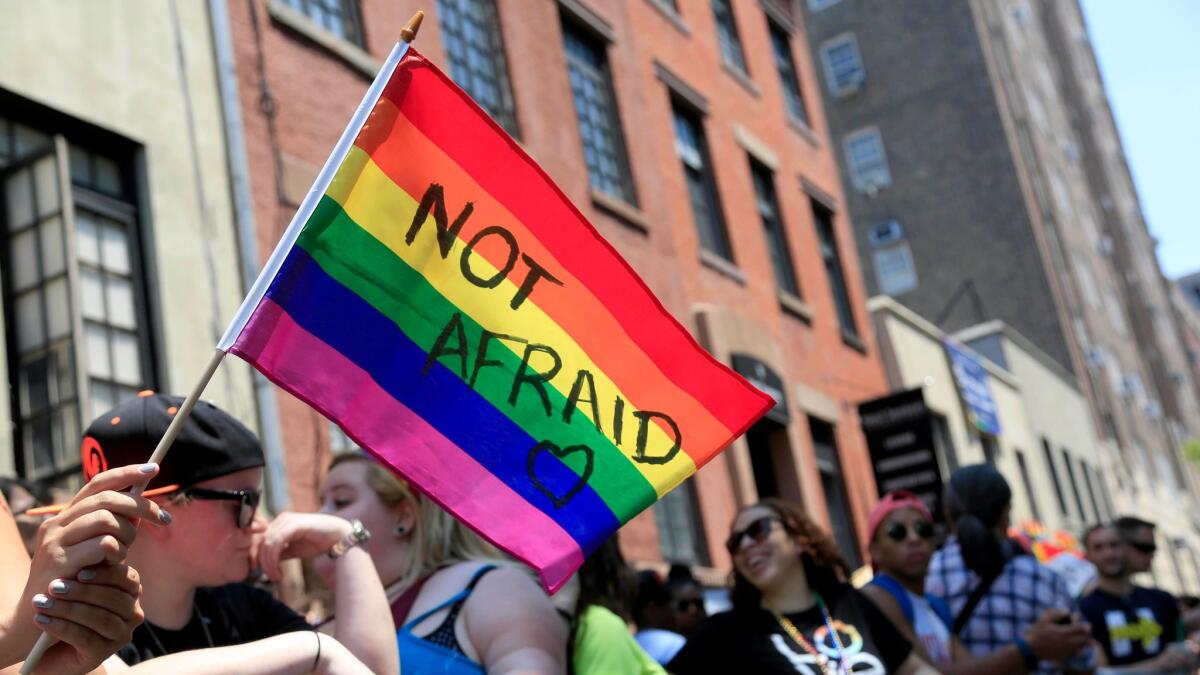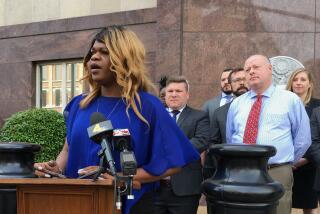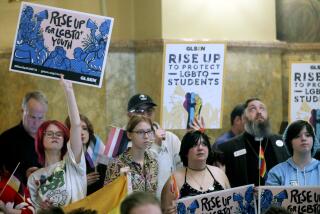LGBTQ people now protected under Civil Rights Act, but some aren’t OK with that

The decision this week by a federal appeals court that said the Civil Rights Act of 1964 protects LGBTQ employees from workplace discrimination raises questions about the intent of the law passed more than five decades ago as the struggle for racial equality gripped the nation.
In a ruling — the first of its kind — the U.S. 7th Circuit Court of Appeals decided on Tuesday that the act protects LGBTQ people from discrimination by employers. The decision came after the court threw out a finding last year by three of its judges who ruled that the law doesn’t cover sexual orientation bias.
The case originated from a lawsuit by an Indiana teacher alleging that a community college didn’t hire her full time because she is a lesbian. Many law experts expect the issue to be placed before the Supreme Court at some point.
Although advocates of LGBTQ rights lauded the ruling as a needed step to curb discrimination, some like Bishop Garland R. Hunt said Wednesday it’s an “atrocity to the African American lives lost to pass the Civil Rights Act.”
For Hunt, the ruling is an affront to the Civil Rights Act, which he said was meant to undo the ramifications of slavery and Jim Crow laws — inequality, poverty, lack of education, to name a few.
“Blacks have been killed and discriminated against solely because of our skin color,” said Hunt, who is the head pastor at the Father’s House, a predominantly African American church in the Atlanta suburbs.
In recent years, Hunt, along with many black pastors, have been outspoken in their views that LGBTQ rights are not civil rights.
Hunt says that while the Civil Rights Act outlaws discrimination based on race, color, religion and sex, it should not benefit gays and lesbians.
“It seems some are trying to make the efforts for gay rights similar to the struggles minorities faced in the effort for equality,” he said. “Really, this should be about racial discrimination.”
For some African Americans such as Hunt, whose Christian views have led him to oppose same-sex marriage, the progress of LGBTQ rights has caused concern that the struggles of blacks who endured Jim Crow laws will be overlooked.
In 2012, when President Obama announced his support for same-sex marriage, many in African American churches nationwide did not agree with his views on the issue. Many polls showed that black voters — who overwhelmingly supported Obama — viewed same-sex marriage differently than he did.
Still, not everyone views the ruling the same. Some say that discrimination is discrimination and must be banned in workplaces nationwide.
Marc Morial, chief operating officer of the National Urban League, among the nation’s largest civil rights organizations, lauded the decision.
“It’s the correct ruling in the fight for civil rights for all,” Morial said. “These protections need to be granted to everyone — regardless of race, religion or sex.”
Morial said the “foundation of the Civil Rights Act was race, but it’s always been much more broader as well.”
Even though the Supreme Court legalized same-sex marriage nationwide in 2015, other legal protections, including housing and employment, have not been across the board for LGBTQ people.
Sarah Warbelow, legal director for the Human Rights Campaign, a group that advocates for the equal rights of LGBTQ people, lauded the ruling and said that “everyone recognizes and understands that experiences of African Americans in the country are different from the LGBTQ community.”
“Both groups have faced discrimination,” she said. “We should not compare the two struggles. No one should face discrimination.”
Greg Nevins, who argued the case before the 7th Circuit, said the focus must be on Title VII of the act, which prohibits workplace discrimination.
“Of course there are different historical factors,” Nevins said. “This ruling says that gays and lesbians are covered.”
Still, there are those with the views of Bishop Gilbert Thompson, founder of Jubilee Christian Church in Boston. He agrees with Hunt in that gays and lesbians should not be afforded protections under the Civil Rights Act.
“I don’t think anyone should face discrimination — let that be clear,” he said. “But in my view I don’t think gays and lesbians should be lumped in with civil rights, I just don’t.… In a workplace, you shouldn’t be forcing your sexual orientation anyway. Where as if you’re black or a woman, that’s something you can’t hide or put to the side. It’s who you are and for all to see.”
Twitter: @kurtisalee
More to Read
Sign up for Essential California
The most important California stories and recommendations in your inbox every morning.
You may occasionally receive promotional content from the Los Angeles Times.











